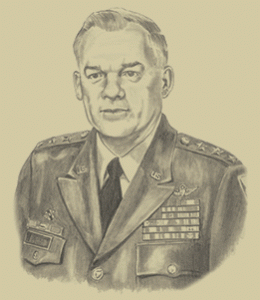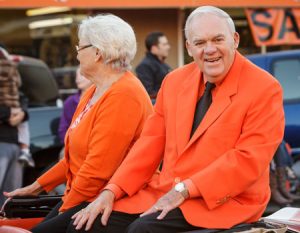 After a military career spanning more than three decades, Lt. Gen. Max Bunyard’s love for his country and serving others is obvious. Bunyard was standout baseball player at Oklahoma A&M College in Stillwater, and was a leader on and off the field. While at Oklahoma A&M, he was involved in the Army ROTC program, the Blue Key National Honor Society and served as president of the Sigma Chi fraternity.
After a military career spanning more than three decades, Lt. Gen. Max Bunyard’s love for his country and serving others is obvious. Bunyard was standout baseball player at Oklahoma A&M College in Stillwater, and was a leader on and off the field. While at Oklahoma A&M, he was involved in the Army ROTC program, the Blue Key National Honor Society and served as president of the Sigma Chi fraternity.
Bunyard served two combat tours in Vietnam. His first tour was with the First Infantry Division Artillery, serving as an artillery aviation officer. On the second tour, he commanded an aerial field artillery battalion in the First Cavalry Division.
He also was a project manager for the Patriot air defense missile system before assuming command of the U.S. Army Missile Command and Redstone Arsenal, Ala. His responsibilities there included being installation commander of the arsenal and being in charge of Army missile research, development, procurement, fielding and sustainment worldwide.
Bunyard also served in Korea; Germany; Fort Carson, Colo.; Yuma Proving Ground in Arizona; Fort Sill, Okla.; Fort Monmouth, N.J.; and several tours in the Washington, D.C., metropolitan region.
Bunyard’s Pentagon tours included weapon systems analyst in the office of the assistant vice chief of staff of the Army; deputy director for defense test and evaluation in the office of the deputy under secretary of defense for research and engineering; and the Army’s assistant deputy chief of staff of research, development and acquisition.
His last assignment before retirement was as deputy commanding general for research, development and acquisition at the U.S. Army Materiel Command in Alexandria, Va.
In the military, Bunyard found an outlet for his love for baseball. In 1963, he became the 3rd Infantry Division baseball coach while stationed in Kitzingen, Germany, and looked to a mentor for advice.
“I stayed in contact with Coach Greene because I needed some help on how to collect data on the pitchers and players,” Bunyard says. “He was the most helpful.”
No matter the distance from Stillwater, Bunyard still encountered fellow Cowboys.
He was surprised when he met classmate Don Bliss in Vietnam in 1965. Bliss was the aviation officer of the 173rd Airborne Brigade, and the two shared an experience they will never forget.
“I heard he was there, and I called to see if I could come fly an orientation mission with his unit as I entered Vietnam on my first tour,” Bunyard says. “He said my orientation flight would be with another pilot, and we would deliver supplies to a unit that was currently in contact with the Viet Cong. As we approached the extremely small landing zone in the middle of the jungle, we were taken under intense fire, but we were able to deliver the supplies and get out of there as quick as possible.

“When we returned to the helipad, I asked Don if he was trying to get me killed on my first mission, and we had a big laugh concerning the flight. The helicopter had to be evacuated to maintenance because of the numerous bullet holes sustained in flight. Don and I talked by phone recently and rehashed this incident, and we both remembered all the details.”
Bunyard’s military awards include two Distinguished Service Medals, one each from the governors of Alabama and Oklahoma; two Distinguished Flying Cross awards; a Defense Superior Service Medal; a Legion of Merit award; and three Bronze Star Medals.
Although his list of prestigious awards is long, Bunyard remains humble and says working with people has been the most rewarding experience of his career, a sentiment he echoed during a ceremony for his induction into the Oklahoma Military Hall of Fame in 2010.
“It has been my hope and desire to pass along my passion for working with people to my children and grandchildren as well,” Bunyard says. “I have two grandsons who are pursuing a military career, and they appear to be following this path.”
Bunyard retired from the military in 1989. He is one of seven OSU graduates to rise to the rank of lieutenant general — a title currently held by 43 people in the U.S. military. He became president and CEO of Bunyard Enterprises Inc., which provided independent program and process assessments in the weapon system acquisition field for the U.S. Department of Defense. He sold the company and now conducts research and writing on several subjects. Bunyard and his wife live in Alexandria, Va.
